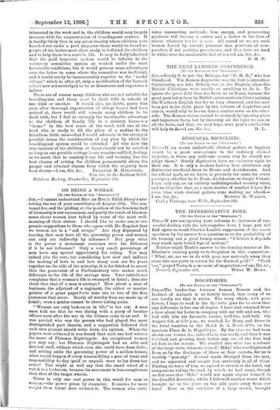ON BEING A WOMAN.
[To TEE EDITOR OF THE " SPECTATOR."]
cannot understand Miss (or Mrs.?) Edith Sharp's mis- taking the sex of your contributor of August 29th. The con- , tempt for, and the girding at, the position of the feminine half of humanity is not uncommon, and partly the result of the non- sense clever women hear talked by some of the most well- meaning of their sisters. I should like to make one or two prosaic suggestions to those who agree with Mr. Bagehot that we women are in a " sad scrape." Are they depressed by bearing that men have all the governing power and women can only act indirectly by influence Bnt pray what is the power a statesman exercises over his followers if it be not influence ? Only a very small percentage of men have any special opportunity for ruling. You may indeed cite the vote, but considering how slow and indirect the making of laws is, and how many men are for years together on the side of the minority, it is far-fetched to assert that the possession of a Parliamentary vote makes much difference to the life of the average man. Your contributor complains that a woman's life is swamped in detail ; does she think that that of a man is exempt ? How about a man of business, the adjutant of a regiment, the editor or master- printer of a great paper P—to take one or two of the first instances that occur. Surely all worthy lives are made up of detail ; even a genius cannot be above taking pains.
" Women are only lookers-on in life," is her cry. A man once told me that he was dining with a party of brother officers soon after the war in the Crimea came to an end. It was queried who was the person who had played the most distinguished part therein, and a suggestion followed that each man present should write down his opinion. When the papers were collected it was found that each one had written the name of Florence Nightingale. An exceptional woman you may say ; but Florence Nightingale had an able and devoted staff, without which even she could have done little ; and setting aside the governing power of a million homes, what would happen if every woman filling a post of trust and responsibility to-day (paid or unpaid) were to lay down her arms ? You might as well say that the small wheel of a watch is a looker-on, because its movement is less conspicuous than that of the larger wheels.
There is only one real power in this world for man or woman,—the power given by character. It carries far more weight than talent does without it. The woman who culti-
vates unswerving rectitude, firm energy, and persevering goodness will become a centre and a factor in the lives of others wherever her lot is cast. All round us we see such women forced by outside pressure into positions of com- parative, if not positive, prominence, and they have no need to whine over the unalterable fact of sex.—I am, Sir, &c., E. M. P.


































 Previous page
Previous page